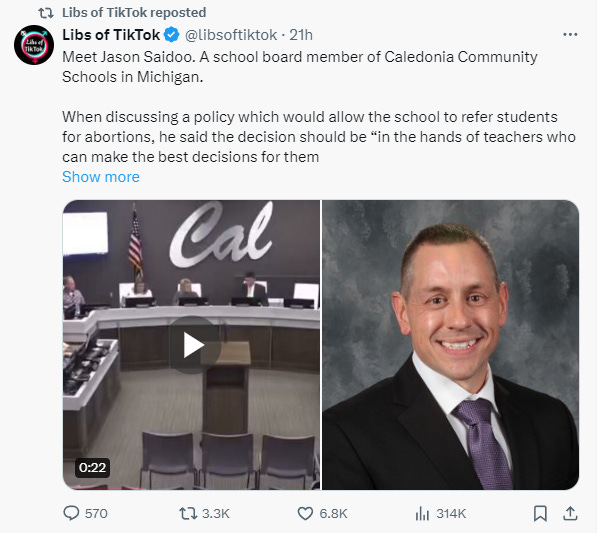CALEDONIA, Mich - The Caledonia Michigan school board met recently, and one of the items they discussed was voting to repeal a policy that disciplined teachers or staff members who referred a pupil for abortion or assisted a pupil in obtaining an abortion.
In 2023, the Michigan legislature repealed 388.1766 Repealed. 2023, Act 103, Eff., which referred to a disciplinary policy for referral of pupils for abortion or assisting pupils in obtaining an abortion.
These changes are now happening because Michigan voters passed Proposal 3 in 2022.
The Caledonia School Board entered into a discussion about repealing their policy regarding this law change.
Watch the discussion by clicking here.
The controversial account on X (Twitter) called Libs of TikTok posted a screenshot about the Caledonia, Michigan school board and specifically calling out board member Jason Saidoo.

Support my independent journalism if you have not done so already by becoming a paid subscriber. It’s $5 a month you can quit at anytime. Please help me, to keep doing my reporting.
I reached out to board member Saidoo and he released the following statement:
“I encourage anyone to listen to my full comments from the meeting where I say abortion should be a conversation with parents and that 99.9% of the time those questions, when asked of school employees, should be met with "that's a conversation to have with your parents." My concern remains for those kids who may not have parents at home for one reason or another. In some cases, the only trusted adults in kids' lives are school officials with whom they spend 8+ hours of their day. Sometimes kids just need someone trusted to talk to, not as a way to co-opt parents, but just to help.” said Saidoo.
In Michigan, the referral of a pupil for an abortion or assisting a pupil in obtaining an abortion involves specific legal, ethical, and procedural considerations. Here's a detailed overview specific to Michigan:
Legal Considerations in Michigan
Parental Consent:
Michigan law requires that a minor (anyone under 18) seeking an abortion must have the written consent of at least one parent or legal guardian.
If the minor does not want to or cannot obtain parental consent, they can seek a judicial bypass, which involves obtaining permission from a judge.
Judicial Bypass:
The judicial bypass process allows a minor to petition a court to waive the parental consent requirement. The judge will consider whether the minor is mature enough to make the decision independently or if an abortion is in the minor’s best interest.
Confidentiality:
Under Michigan law, schools must maintain student confidentiality. The Family Educational Rights and Privacy Act (FERPA) also requires that student records, including those related to health and counseling, remain confidential unless there is a legal requirement to disclose.
Mandatory Reporting:
Educators in Michigan are mandatory reporters of suspected child abuse or neglect. If a minor's pregnancy is suspected to be the result of abuse, educators are required to report this to Child Protective Services.
Mr. Saidoo told me As a result of MCL 388.1766, Michigan schools had to adopt a policy prohibiting referral or assistance related to abortion. Caledonia adopted this policy in February 2018, as no such policy existed. After the passage of Proposal 3 in 2022, the law on which this policy was based was eliminated. The policy management firm Neola recommended rescinding the policy altogether, and I agree with this recommendation. However, other board members wanted to retain the policy but remove the citation of the now-eliminated law. This issue has been discussed four times, including a brief discussion in April's meeting
The Caledonia School Board voted to table the discussion and discuss it at another time. As of now, the current policy is in place prohibiting referral of assistance for an abortion.
Proposal 3, also called the Reproductive Freedom for All (RFFA) amendment by organizers, struck the 1931 ban on abortions from Michigan law and created additional protections for people seeking reproductive health care.




















